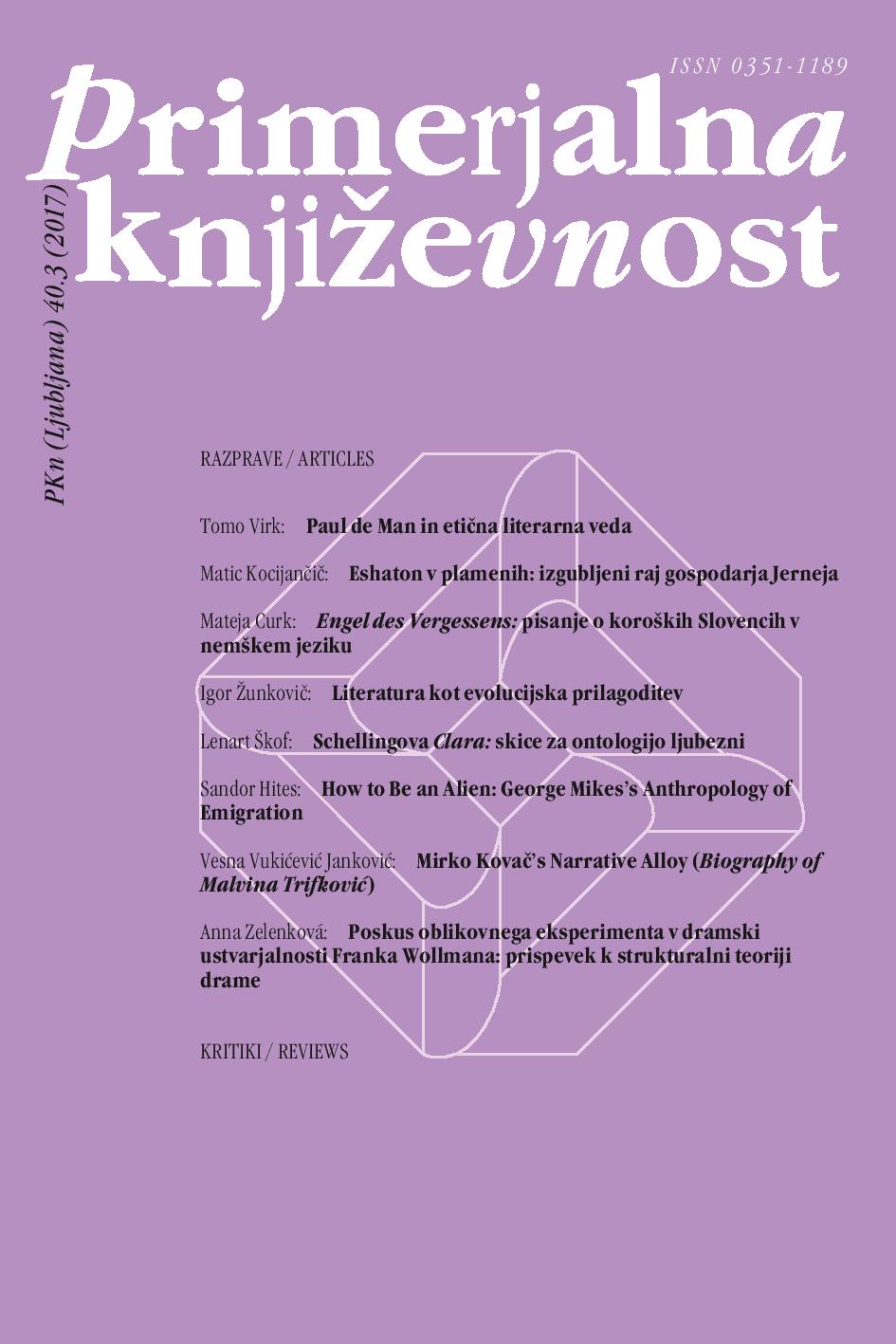Kako biti tujec: antropologija emigracije Georgea Mikesa
Ključne besede:
angleška književnost, satira, intelektualci, emigracija, Vzhodna Evropa, Madžarska, Mikes, George, How to Be an Alien, nacionalni stereotipi, tujostPovzetek
Članek obravnava satirično uspešnico How to Be an Alien (1946), ki jo je napisal madžarski emigrantski novinar in prominenten britanski humorist George Mikes (1912–1987). Izkaže se, da Mikes pri obravnavi vprašanj emigracije, integracije in pripadanja uporabi karikiran antropološki pristop. S tem, ko ironično predela koncepte opazovanja in imitiranja (domorodcev) kot preživetvene strategije, imenitno opozori na absurdnost tako britanskega življenja kot tudi prizadevanj prišleka, da bi se stopil z okoljem. Nadaljevanji uspešnice, ki ju je Mikes napisal desetletja pozneje, razkrivata, da tudi ko je »tujec« enkrat uspešno integriran, občutek pridobljene britanskosti proizvaja le še nadaljnje absurdnosti. Podrobnejši pogled pokaže, da je Mikesevo satiro mogoče videti tudi kot doslej neopažen prispevek k moderni filozofski tradiciji »tujosti« (npr. pri avtorjih, kot so G. Simmel, H. Arendt, Th. Adorno in Z. Bauman). Mikeseva zapuščina še vedno navdihuje izseljence v Londonu, pa tudi drugje. Toda to emblematično delo je navdihnilo tudi vrsto knjig z diametralno nasprotnim namenom – namreč takšnih, ki opogumljajo (domače) bralce, naj se vnovič oprimejo dozdevno pešajoče socio-kulturne dediščine. V transformiranju Mikeseve satire o tujcih, ki se prilagajajo novemu okolju, v opogumljanje »domačinov«, naj se vendar oklenejo lastne tradicije, se obenem zrcalita tako dezintegracija tradicionalne kulturne pripadnosti kot tudi nova privlačnost »domorodnosti«.Literatura
Adorno, Theodore. “Refuge for the Homeless” [1944]. Minima Moralia. Reflections on a Damaged Life. Trans. E. F. N. Jephcott. London: Verso, 2005. 38–39.
Arendt, Hannah. “The Jew as a Pariah: A Hidden Tradition.” Jewish Social Studies 6.2 (1944): 99–122.
Clifford, James. “Introduction: Partial Truths.” Writing Culture: The Poetics and Politics of Ethnography. Ed. James Clifford, George E. Marcus. Berkeley: University of California Press, 1986.
– – –. Returns. Becoming Indigenous in the Twenty-First Century. Cambridge (MA): Harvard University Press, 2013.
Congdon, Lee. Exile and Social Thought: Hungarian Intellectuals in Germany and Austria, 1919–1933. Princeton: Princeton University Press, 1991.
Crick, Malcolm. “Representations of International Tourism in the Social Sciences: Sun, Sex, Sights, Savings and Servility.” Annual Review of Anthropology 18 (1989): 307–44.
Culler, Jonathan. “The Semiotic of Tourism.” Framing the Sign: Criticism and Its Institutions. Norman: University of Oklahoma Press, 1989.
Deciu Ritivoi, Andreea. Intimate Strangers: Arendt, Marcuse, Solzhenitsyn, and Said in American Political Discourse. New York: Columbia University Press. 2014.
Fletcher, Adam. How to Be German. In 50 Easy Steps. Munich: C. H. Beck, 2013.
Fox, Kate. Watching the English: The Hidden Rules of English Behaviour. London: Hodder, 2004.
Friedlander, Albert H. “George Mikes.” Routledge Encyclopedia of Jewish Writers of the Twentieth Century. Ed. Sorrel Kerbel. New York: Fitzroy Dearborn, 2003.
Hites, Sándor. “To Be Born into Exile. Kelemen Mikes and the 19th-20th Century Hungarian Literary Exiles.” Transmission of Literature and Intercultural Discourse in Exile. Ed. Gábor Tüskés, Bernard Adams, Thierry Fouilleul, Klaus Haberkamm. Bern: Peter Lang, 2012. 445–457.
Holmes, Colin. “British Government Policy Towards Wartime Refugees.” Europe in Exile: European Exile Communities in Britain, 1940–1945. Ed. Martin Conway, Jos Gotovich. New York: Berghahn, 2001.
Kabdebo, Thomas. “George Mikes.” Encyclopedia of British Humorists. Volume 2. Ed. Stephen H. Gale. New York: Garland, 1996. 763.
Leerssen, Joep. National Thought in Europe: A Cultural History. Amsterdam: Amsterdam University Press, 2006.
Malinowski, Bronisław. Argonauts of the Western Pacific [1922]. London: Routledge, 2002.
Mikes, George. The Land of the Rising Yen. London: Deutsch, 1970.
– – –. Any Souvenirs? Central Europe Revisited. London: Deutsch, 1971.
– – –. How to Be Seventy. An Autobiography. London: Deutsch, 1982.
– – –. How to Be a Brit. (How to Be an Alien: A Handbook for Beginners and Advanced Pupils [1946]; How to Be Inimitable: Coming of Age in England [1960]; How to Be Decadent [1977]). London: Penguin Books, 1986.
Neubauer, John. “Exile: Home of the Twentieth Century.” The Exile and Return of Writers from East-Central Europe. Ed. John Neubauer, Borbála Zsuzsanna Török. Berlin: De Gruyter, 2009. 4–103.
Pratt, Mary Louise. “Fieldwork in Common Places.” Writing Culture: The Poetics and Politics of Ethnography. Ed. James Clifford, George E. Marcus. Cambridge (MA): University of California Press, 1986. 27–50.
Rapport, Nigel. “‘Best of British!’ An Introduction to the Anthropology of Britain.” British Subjects. An Anthropology of Britain. Ed. Nigel Rapport. Oxford: Berg, 2002. 3–23.
Rubiés, Joan Pau. “Travel Writing and Ethnography.” The Cambridge Companion to Travel Writing. Ed. Peter Hulme, Tim Youngs. Cambridge: Cambridge University Press, 2002. 242–260.
Scheding, Florian. “‘I Only Need the Good Old Budapest’: Hungarian Cabaret in Wartime London.” Twentieth-Century Music and Politics: Essays in Memory of Neil Edmunds. Ed. Pauline Fairclough. London: Routledge, 2013. 211–230.
Simmel, Georg. “The Stranger.” The Sociology of Georg Simmel. Trans. Kurt H. Wolff. Glencoe: The Free Press, 1950. 402–408.
Szirtes, George. A Mini-Essay on George Mikes. http://georgeszirtes.blogspot.hu/2009/09/mini-essay-on-george-mikes-part-1_22.html.
Tabori, Paul. The Anatomy of Exile. London: Harrap, 1972.
Timms, Edward, Hughes, Jon (ed.). Intellectual Migration and Cultural Transformation: Refugees from National Socialism in the English-Speaking World. Vienna: Springer, 2003.


